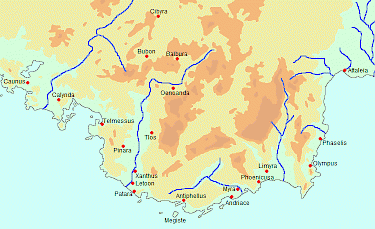Lycia (3)
Q18927Lycia: the mountainous southwest of Turkey.

After the mid-fifth century, we find the Lycians in the Athenian alliance, the Delian League, which was directed against Persia and Sparta. This may indicate that the Lycians had become unhappy with Persian rule, but it is also possible that an Athenian army or navy had forced them into surrender. We know for certain that Cimon was active in this area in c.468, but there must have been similar, unrecorded expeditions.
From this moment on, Greek civilization influenced the Lycian way of life. The small towns increasingly started to look like cities; people who built rock tombs were often imitating Greek architecture; and many texts were written in two languages. The Greeks also became increasingly interested in Lycia. However, there was always room for misunderstanding. For example, Herodotus says that the Lycians thought it was more important to know a person's mother than his father.note an idea that is hardly borne out by epigraphic evidence.

When the Athenians and Spartans in 431 became enemies, Lycia regained its independence, which inevitably led to more Persian influence. Its main ally Xanthus was able to expand its power and conquer Telmessus. Yet, there were also people who wanted to revert to a more pro-Athenian policy, or proposed complete independence. One such leader was Pericles of Limyra, who, in c.400, established himself in the eastern part of Lycia, started to call himself "king of Lycia", proceeded to the west, defeated a prince named Arttumpara (the Lycian form of the Persian name Artembares), captured Telmessus, and put an end to the Xanthian dynasty.
After the Revolt of the Satraps (367-362), Lycia reverted to Persian authority, as is clearly shown by the Xanthus Trilingue, which shows that the local Persian ruler was fully in charge. The Lycians were now dependent on Maussolus, the satrap of Caria. He was also a hellenized ruler, proving that Persian political control did not exclude Greek cultural influence.